
Plus News
May 1998
![]()
|
|
|
Andy Says 'I Have A Dream' |
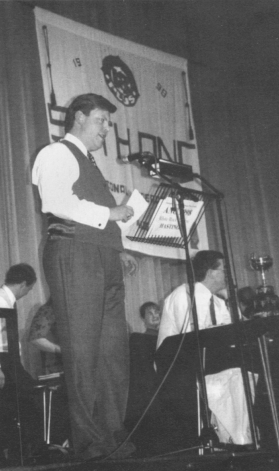 The
57th Annual National Conference (ANC) took place in Hastings on Saturday
9th and Sunday 10th May 1998 in the White Rock Theatre. The
57th Annual National Conference (ANC) took place in Hastings on Saturday
9th and Sunday 10th May 1998 in the White Rock Theatre.
The primary purpose of the ANC is to debate issues affecting 18 Plus at a National level. The first motion proposed raising the full membership fee with 10% of the fee being returned to the member's Area. The intention of this motion was that the money raised would be used for a particular project, for example publicity or development. Arguments were made both for and against but in the end insufficient delegates voted for the motion, so it was lost. The second motion was that a six-month membership be introduced for people who are unable to reside in the country for a full year. The motion was carried. There were also motions to amend the posts on an Area Executive Council and concerning the number of Area meetings. Both these proposals were accepted. The most contentious motion was to raise the upper age limit for full membership from under 30 to under 36 years of age. A variant of this proposal had been discussed at last year's ANC but had narrowly failed to gain the necessary support. This year however the motion gained greater support with only 9 votes against and 3 abstentions. The final three motions were all lost. As ever at the ANC the Saturday night Dinner Dance had a great party atmosphere with the National Chairman, Sandra Bradshaw, dancing on the tables and discovering a miracle cure for loss of voice (tons of alcohol!) The other purpose of the ANC is to elect the National Chairman for the next twelve months. Sandra had served the maximum number of terms (three years). Andy Bond (pictured left) had been nominated for the post. As the rules require, Andy made his own proposal speech. Apart from the odd bit of pontificating and being the next in the line of handsome (?) and beautiful National Chairpersons, he will also be following "his dream". This dream is to be the first National Chairman for more than ten years to stand up at an ANC and say that the Federation has increased its year on year membership. He wants the Federation to have renewed perspective, aims, goals, pride and involvement, and for the members to be able to say "Free at last, free at last, thank God almighty we are free at last" (a quote from a Negro spiritual). Andy Bond was duly elected as National Chairman to serve from Monday 9th June 1998. In recognition of her hard work as National Chairman, Sandra was presented with a crystal Winnie The Pooh. She also received a gold record (a spray painted version of one of her favourite record the 18 Plus song) and perhaps least desirably a present from a "secret admirer", a sun shade! KATIE HAWKINS
KEY DECISIONS MADE AT ANC 98
|
Editor's Column |
| Thanks to all contributors and advertisers in this
issue. You will see that this issue contains one rather large article.
I have printed it in its entirety as it was impossible to edit down without
losing much of the interesting content.
In answer to a recent enquiry, there is not a charge to have normal articles printed. The only charges made are for adverts or "advertising feature" articles. Sadly this is the last Chairman's Column written by Sandra (although with the change in the age range she could very well be back). She has been an excellent National Chairman and richly deserves the HLM she was awarded at the ANC. She'll be a hard act to follow but I'm sure that Andy will cope and bring his own inimitable style to the post. I look forward to printing his first column in the August issue (as long as it's on time, Andy!) Katie Hawkins
|
Chairman's Column |
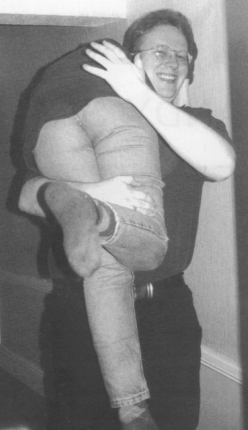 By
now you will be aware of the outcome of the ANC. The upper age range changed
from 30 to 36 years old. This change, along with the sale of Nicholson
House and the Area restructuring should breathe a bit of fresh air into
the Federation. The chance to be more successful must he seized by all
of us. The ANC was fun and relaxing this year but it would be nice to see
more delegates at next year's Conference at Buxton. I was pleased that
there had been an increase in the number of motions received but I would
like to see more debate. By
now you will be aware of the outcome of the ANC. The upper age range changed
from 30 to 36 years old. This change, along with the sale of Nicholson
House and the Area restructuring should breathe a bit of fresh air into
the Federation. The chance to be more successful must he seized by all
of us. The ANC was fun and relaxing this year but it would be nice to see
more delegates at next year's Conference at Buxton. I was pleased that
there had been an increase in the number of motions received but I would
like to see more debate.
Three and a half years and four Conferences later I am sad but tired and ready to move on. However I can always take one year off and then return to bring more beauty to the National Chairmanship! Please support Andy Bond in his endeavours as National Chairman. I have various memories of my time as National Chairman. These include car shades, the number of men who have claimed to have slept with me, fielding a love triangle in a hospital, and using the gents loos as they have no queue to stand in. People also seem to have a thing about my knickers! The look on the faces of the NEC when I lose my temper will always stick in my mind. There are various people I must thank, the two companies I have worked for who thought they were letting me go to the doctor, dentist, etc. on many Friday afternoons, given me days off sick when I've been too tired to go into work and given me use of the phone. Also there are my car mechanic, the AA men who have rescued me many times, BT for a good phone link and my trusty white Renault which finally died last year. I'd like to thank the Federation for the great honour bestowed on me - an Honorary Life Membership. It was a shock and a surprise but one that is greatly appreciated and motivates me to offer more to the Federation. You haven't seen the last of me yet! See you soon
Photo - Jon Black removes Sandra Bradshaw from Nicholson House |
Solihull Charity Bed Push |
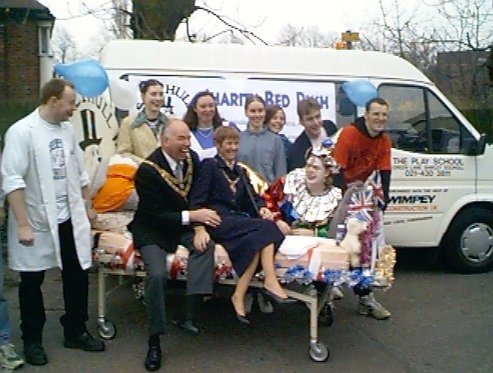 Solihull
18 Plus performed a Charity Bed Push in March to raise money for Solihull
Handicapped Children's Association. The bed was kindly loaned by Solihull
Hospital and pushed 5 miles through the streets of Solihull from the hospital
to the Handicapped Associations centre. The Push was formally started by
the Mayor of Solihull, Peter Hogarth. Solihull
18 Plus performed a Charity Bed Push in March to raise money for Solihull
Handicapped Children's Association. The bed was kindly loaned by Solihull
Hospital and pushed 5 miles through the streets of Solihull from the hospital
to the Handicapped Associations centre. The Push was formally started by
the Mayor of Solihull, Peter Hogarth.
Around twenty members took part, many in fancy dress. At the end of the Push we were greeted by the Centre staff with tea and biscuits and shown around the facilities. £492 was collected on the day and with sponsorship money still being collected, nearly £1000 has been raised. Thanks to Pete Sharples of Solihull Group for the enthusiasm in the organising of this event. MARK HEWSON
|
ANC 98 Trophy Winners |
ANC Dinner Dance Photos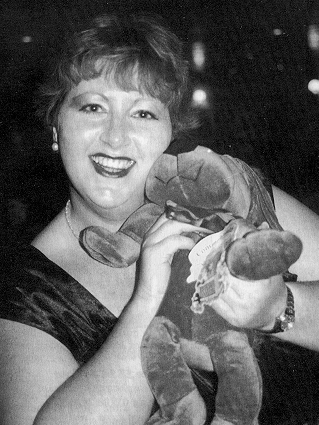
Judy Horsburgh, National PRO - "I have a cuddly toy"
|
Spice Girl Engaged |
| A member of that well known group, Five Spice (see February 1998 issue) announced her engagement in April. She is Kate Williams ('Sugar and Spice') and she has got engaged to Andy Kinsey (South Essex Area Treasurer). In between guest appearances at select Essex events she is Chairman of Redbridge 18 Plus. It is believed that her ring didn't quite cost £150,000 and there isn't likely to be any trouble from Customs officers. Congratulations to you both. |
Gangster's Paradise |
| When I first heard about the Gangster Party
at Redbridge, I knew I had to be there, along with my fellow Unmentionables.
After the rendezvous with other Eltham members including the Big Chief
himself, Richard Chiesman (who considered himself 'The Don') it was time
to hit the road. Course, not before a spot of posing! The journey there
was on the whole uneventful. At one junction, we managed to evade a police
roadblock with consummate ease! Suckers!.
Before long, it was time to 'hit the joint'. The Don howled along as The Godfather wouldn't, closely followed by The Unmentionables and the rest of our gang. Fittingly, "Gangsta's Paradise" was blaring out as we all walked in the door. These gangstas were now in paradise. With criminal like efficiency, we soon located Dartford's gang and muscled in on their territory. Soon enough, myself and Paul 'You can call me Al (Capone)' Haylett were up to our old tricks and began racketeering. Our first victim was to be The Don, but then Capone suggested Pete 'Two Cars' Burlace. Unfortunately for us, he was much too savvy and streetwise to fall for it. Either that, or he knows us too well! With the party in full swing and the Unmentionables posing for the odd mugshot or ten, I literally bumped into Poopsie ! (see February issue of Plus News for more details). Or, put more accurately, he came out from nowhere and nearly gave me a heart attack. The Gangster parade had not yet taken place. I did find enough time, energy and willpower to put in a music request. There's only so much Spice Girls a self respecting gangster worth his Tommy Gun can take. Three songs is definitely "Too Much". Stop playing so many. Your "Mama"! The competition arrived much later than anyone had expected. I should have seen it coming when Capone started to nag me for my deluxe authentic trilby hat. All the contestants stood in what you can laughingly call a straight line and we all did the catwalk for the cameras. (Why did no-one use mine?) The Don, Capone and myself were joined by Kevin 'The Tux' Ridgeway and Cliff 'Nailz' Thomson. Two winners were chosen and one of those was indeed Capone. Not bad for someone who didn't have a costume before leaving! The trilby did it. Back to the music and my very special request was actually played. This was in spite of Capone and myself jumping on stage and partying on in front of the DJ. That pleased him no end! Kent Area suddenly joined forces to become lemmy wannabes as "Ace of Spades" shattered almost every window in the place. It was well worth the wait. Lee 'Capt. Slackbladder' Kennedy suddenly burst into life and didn't stop until much later. The end of the disco didn't mean the end of the fun. That was just beginning! We still had the job of getting home. On the way, Capone was dared (not by me!) to stick his head out of the sunroof. Nailz only just had enough time to open it before Capone stood up. If that wasn't enough for Two Cars, a few minutes later, he, The Don and Capt. Slackbladder were 'treated' to a rare second full moon on successive nights courtesy of Capone! Two Cars didn't know where to look. The Don didn't know whether to laugh or cry, but Nailz and I certainly did! Credit goes to Redbridge 18 Plus for putting on a great event and to everyone who attended. During the entire night, not one pair of concrete wellies were seen. LES 'EATI' LEAD, SUCKER!' HEWITT
|
Northfield 18 Plus Charity Ball - The Event Of The Year |
| On 5th September 1998 Northfield 18 Plus Group (Mid
West Area) are holding a Grand Charity Ball in aid of ChildLine.
The fun will begin at 2.00pm with an adult entertainer / comedian followed by the evening dance with over f 700 of raffle prizes to be won including a weekend away for two. The evening will consist of a fantastic 10 piece live band called "Souled As Seen", a disco, and a visit from a very famous special guest. Tickets for the afternoon event will be f 2.50 and for the evening performance tickets will cost £4.00 in advance and £5.00 on the door. If tickets are bought for both events there will be a reduction of £1.00. 18 Plus members are welcome to bring guests to this Charity Ball at the discretion of the Northfield Group Chairman, Emma Hudson. Tickets will be going on sale soon and they will be sold on a first come, first served basis. Both events will be held at Haden Hill Leisure Centre, Barrs Road, Cradley Heath, Sandwell, West Midlands. Members wishing to play sport or relax with an afternoon swim may do so after seeing the magician. It has also been arranged that all members attending both events may use the changing rooms and shower facilities before the dance. There will be a cafe open on site until 9.00pm and a bar open for the afternoon event. Bed and breakfast accommodation is being arranged for those wishing to make a weekend of it. Transport from the accommodation to and from the venue will be available for all those drinkers out there. For more information and an all inclusive price, please call Emma Hudson on 0121 544 3142. |
National News |
| Sarah-Jane and Vaughan (Nicholson House Officer)
Wonnacott increased their family by two in April with the births of Jordan
Daniel and Laura Elizabeth. Jordan is the eldest (by two minutes!) Congratulations
to the proud and busy parents and to the twins' big sister Stephanie.
Alison Brand (Barking & Dagenham l8 Plus) won an unusual
raffle prize at the Stevenage 18 Plus Valentine Disco, an engagement ring!
Colin Rumford (former Chiltern Area Chairman) was drawing the raffle tickets
and managed to arrange that the last number drawn was Alison's. When she
went up to collect her prize he went down on one knee and luckily she said
yes. Congratulations to you both.
|
WASH 98 Changes |
| Please note that there have been some changes to the
WASH 98 committee.
Jane Webster, who was elected as Bookings Officer in January, has discovered that she is due to have a baby just before WASH so she has resigned from the committee. Her wealth of experience will be missed by the committee, but we all send Jane and Paul our congratulations! Sue Rowland (previously Administrator & Publicity) has therefore taken over Jane's role as Bookings Officer. Sue's previous role will now be filled by a new (and younger!) face on the committee, Norwich Group's current Chairman, Paul Mallett. Paul may be new to the WASH committee but he has had considerable experience of being on committees at both Group and Area level. Paul has also attended several WASH weekends, although he cannot remember all of them due to the large amounts of beer he usually consumes! Paul and Sue can both be contacted on 01603 665690. Sue is planning to send out WASH booking forms in June so start saving up now (unless you are the lucky person who has already won a free WASH place by entering the raffle at the ANC!) WASH remains great value for money, with this year's price at ONLY £42.00. Watch for more details about WASH 98 in later editions of Plus News . SUE ROWLAND WASH 98 Bookings Officer |
5 Things You Never Knew About... Chris Page of Welwyn Garden City 18 Plus |
|
Solihull 18 Plus Comes Of Age |
| Solihull 18 Plus decided to celebrate 21 years of
existence in March by making it a reunion party. Invites were sent out
to all members that had been in the group for more than a year (over 240
of them). Fifty-five ex-members turned up on the night, oddly enough most
of whom were from pre 1983 era. Overall we had over 140 people attend with
our own and other groups' members. Ex-members from as far away as Sussex
turned up. We even had a folder of photos and information from a couple
who had emigrated to Australia sent to us.
A special birthday cake with our logo on it was then cut by all the ex-Chairmen present whilst the Mayor of Solihull gave an introductory speech. We had a display board full of photographs and information about the group and Solihull's own disco 'Music Box' was able to pump out some of the old tunes which we were well known for dancing to in years gone by. The older members still knew the routines. The evening turned out to to very enjoyable with many old friendships being rekindled. Many thanks to to all those who worked very hard to make this event so successful. MARK HEWSON
|
National Badminton |
| Saturday 28th February was the day when 17 badminton
teams descended on Clements Hall, Hawkwell, Essex for the National Badminton
competition.
The day was fairly hectic to start with, getting teams on the right courts at the right time for their matches, but once we got going the event ran reasonably smoothly. Thanks go to Barnet and Wimbledon 18 Plus for supporting the event. They were the only Groups from outside South Essex Area to send teams. Thanks must also go to everyone who helped out with the umpiring and to Gill, Gordon and Linda who helped with the scheduling of games and the collating of results. The eventual winners were Chelmsford, second place went to Redbridge, and third place to Wimbledon. The competition was followed in the evening by a disco which was well organised by Adrian. JULIA FAULKNER
|
History Of Nicholson House |
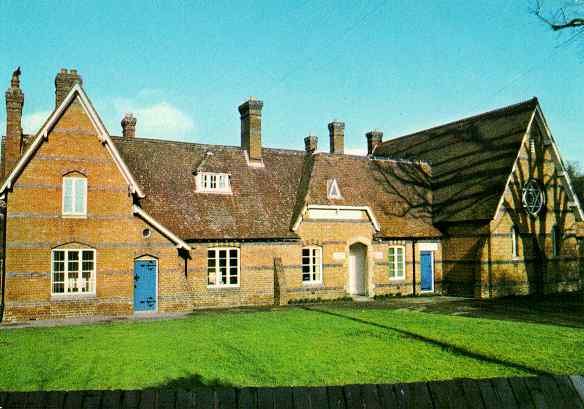 At
the 1970 ANC the idea was put forward that a headquarters building for
the Federation should be purchased and named after the first National Chairman
and President, Dr Nicholson. A Nicholson House Fund was established and
various fundraising activities undertaken. Then in 1973 the NEC decided
that serious efforts should he made to obtain our premises. The surplus
from TAG '73 helped to swell the fund further. At
the 1970 ANC the idea was put forward that a headquarters building for
the Federation should be purchased and named after the first National Chairman
and President, Dr Nicholson. A Nicholson House Fund was established and
various fundraising activities undertaken. Then in 1973 the NEC decided
that serious efforts should he made to obtain our premises. The surplus
from TAG '73 helped to swell the fund further.
An NEC sub-committee was formed in 1974 to investigate money-raising schemes, the type of facilities needed, location, grant possibilities etc. 17th - 23rd February 1974 was designated as Nicholson House Week and all groups were asked to raise money for the project. Many people had different ideas about Nicholson House but initially it was intended that it would house the "office" and act as the Federation HQ. If enough finance was available it was envisaged that there would also be a meeting / conference room providing premises for the local l8 Plus group, library and possibly club facilities (bar / disco etc.) for our age range. The Office at that time was a room above a jeweler's shop at 16-18 High Street, Dartford with access to it being limited to working hours. Prior to that the Office had been in Hastings at 44 Robertson Street in three rooms above what is now a computer shop. In the January 1977 issue of Plus News it was reported that the Federation had been offered the freehold of Aylesbury County Primary School by Hampshire County Council for about £21,500. The Nicholson House Sub-Committee looked very thoroughly into the proposal, decided it was acceptable and on 5th December l976 the NEC accepted their advice to proceed. By this time the National Headquarters Building Fund had been open for five years. All levels of the Federation had contributed through fundraising activities but the groups of the North West Area were given a special mention for their tremendous efforts. More money was still needed and the Sub-Committee were urgently following up possibilities of grants from charitable foundations. However, by July 1977 Hampshire County Council had decided not to offer the school to the Federation. The Nicholson House Sub-Committee were far from discouraged and started looking at some other properties. The most favourable one they found was Newent Magistrates Court. They felt that this was better situated than Awlesbury and closer to the middle of the country. As they said at the time "It has all the accommodation we require, including a cell for awkward NEC members. By September 1977 they had negotiated with Gloucester County Council and had been offered Newent Magistrates Court for Nicholson House at a cost of £20,000. The legal wrangling and planning consents would take the rest of the year, which meant that they needed another £8,000 by January 15th 1978 (approximately £1 per member). A lot of fundraising had gone on already with f3,000 plus being collected in 1976. This was raised through jumble sales, street collections, sponsored events and from the profit of TAG. Lunchtime on the 4th October 1978 saw Nick Richards (National Chairman) and Chris Head (Honorary General Secretary) downing a celebratory pint of Greene King in the Shire Bar of St. Pancras railway station. This was the place where the signing of the contracts for the purchase of Nicholson House took place. The next significant step happened at Stoke-on-Trent when the Southern Area Chairman did a "mercy dash" at 4 o'clock on a Saturday morning from the Vice President's house to get the deeds to the NEC training weekend for signature. Being able to purchase Nicholson House was due to the effort put in by the Nicholson House Sub-Committee, great support and fundraising by groups and a grant from the Department of Education and Science. However we mustn't forget the Nicholson pig who extorted pounds from the NEC when individuals became heated at meetings! The Federation moved into Nicholson House from its offices in Dartford in Decemher 1978. Over the next two years the building was renovated and enhanced whilst preserving the historic character (including the old court room and cell). The building was formally opened as a training and residential centre on 23rd May 1981 by Commander David Cobb who was President at the time. Several rooms were given particular names. The old court room was named The Carnegie Room (after the Carnegie Trust who published the report in 1939 about young unemployed men which led to 18 Plus being started). The lounge was The President's Room and the old cell (which was turned into a 4 bedded room) was of course The Cell! Various rooms were named after fundraisers. There were the East Anglia Area Room (2 bedded room), the Bedford Room (3 bedded room), Easter Room (7 bedded room), the North West Area Room (Sue's office) and the Trentham Room (National Finance Officer's office). It is obviously sad to be losing Nicholson House - to the members of the NEC and the National Officers it has become a home from home. However we must look to the future. As Sandra said when the decision to sell was made: "18 Plus is entering a phase which ensures its long term prospects and the chance to establish some exciting projects for the future without stringent monetary constraints. KATIE HAWKINS
|
Plussing The Internet |
| Who's visited the 18 Plus web site? How about your Area web site?
How many groups have developed their own web sites? The Internet
is an asset that cannot he ignored. Send a press release to a local paper
which mentions the web site and the paper will have no problem finding
out more. If you want to know what's happening on a National, Area or local
level, the l8 Plus web site has the answers. You can also communicate with
other Plussers around the country as you will find their email addresses
and home pages on http://www.eng.warwick.ac. uk/18plus/
One of the problems with 18 Plus is that it's a large organisation with members all over the country. Organisation of Area and National activities relies on phone, post and car. Now we have the Internet, what better means of communicating and discussing projects and developments could there be? We could end all those problems of the right hand not knowing what the left is doing with an improved use of the Internet. There are various methods - an online Chat (typing in a conversation), Discussion Groups (posting messages that are then responded to), Mailing Lists (these are in essence archived conversation; that is to say people are mailed information, usually on a daily basis), Environment (these are fictional environments along the lines of Dungeons and Dragons). Pagers (these are also referred to as 'buddy lists'). Anyone interested in finding out more about the internet should get in touch with their local college, where courses are often run all year round. Such a course would also give you access to the college's computer facilities and you should also get an email address. What more can you ask for? JARRETT SMITH
|
Letters To The Editor |
| I was Chairman of Castle Bromwich 18 Plus in the late seventies when
we opened Solihull 18 Plus as a satellite group. We had a very nice invitation
recently to celebrate Solihull 18 Plus' 21st birthday (my wife Sal was
one of its early secretaries) and they gave us a copy of Plus News to take
away.
With so many articles from Essex perhaps it should be called Essex News. However, my point for writing is to say that although Castle Bromwich 18 Plus does not exist any more, some things never change. I refer to the letter by Andy Bond, which is so demoralising and so critical. I've seen it before - the last person to say such things stood for National Chairman, was elected to put things right (well he had no opposition) and suddenly he had no criticisms to offer. I bet Andy Bond wants to be National Chairman, trying in to right all the wrongs his predecessors have failed to put right. 18 Plus is a brilliant organisation with lots of people doing many things to run local, regional and national events. The majority are always silent, but that does not make Andy Bond's comments right. It's a pity you had to publish them for they reduce the magazine's quality. KEN JONES
|
The Future Of The Group and The Challenge Ahead |
| I was interested to read Andy Bond's letter "The Future of the Federation"
in the last issue of Plus News. It is of course encouraging to see a passionate
cry from someone, indeed anyone. who cares about 18 Plus and the future.
Yet the points raised were somehow depressingly familiar, the same old
chestnuts that have been regularly aired since the membership began to
decline in around 1980. And since that time nothing has been done to tackle
the issues, or at least that appears to he the case. So how can that be,
on the one hand a passion for 18 Plus, on the other hand apparent paralysis?
I believe that in all the chatter and bar room talk the fundamental questions are being lost in the fog, and this is in a way demonstrated by the title of Andy's letter. Is it future of the Federation or the future of the Group? And of course it is the latter - the group is the key. If that is strong then a strong Federation follows. But the group as an entity is in decline, evidence fewer groups of fewer members. For any group to grow, it has to be relevant to its specific target audience, it has to attract members who are prepared to be involved in a club (for that is what an 18 Plus group is), it has to promote the aims and ideals of 18 Plus. All this is obvious, but it is rarely debated along with the big question behind it all: "What is an 18 Plus Group trying to achieve?" Fundamental, period. Now some people, maybe many people, will say that a group is there to run activities for its members. I'm not sure that is sustainable. Firstly, it's treating activities as a commodity, something to be delivered, whereas people actually want social interaction. i.e. a social life. Activities as we define them are only part of a means to this end. Secondly, it's a very thin strand. If you don't like the activities as presented, however good or had, then you will not become involved in the club if you stay at all. I am a member of three 'clubs', the Liberal Democrats, the MG Car Club and the Hertfordshire and Gloucestershire Canal Trust. All run social activities, and many of them are very good. But clearly they all have a larger, central theme, which is why they exist at all. The interesting thing is that in all these organisations some people are committed to the core while some only participate in the social side. 18 Plus has always suffered from the fact that it does not have a central theme, or rather it does not promote a theme based on the aims and ideals of the organisation. Clearly it is necessary to study the aims and ideals from a modern perspective. But unless this is done I believe that we will stay preoccupied with activities to the exclusion of all else. We will miss a whole raft of keen, committed individuals who want to put their ideas and enthusiasm into something worthwhile and at the same time enjoy a varied social life. Who am I thinking of, well people who have worked up through the Guides and Scouts, or perhaps been involved in the running of a youth group, or those that want to put something back into the local community. This could take the form of helping with community projects, environmental or charity work. And what better than to wrap this up in a vibrant social life? Can l8 Plus rise to a challenge like this? Now this brings me on to the thorny issue, the age range. From what I have said so far I believe that our target group is the late teens/early twenties. It doesn't have to be so but that is where enthusiastic people will be found who will be keen to join and become involved in a club type environment. I would argue that older people would tend to join a club with a more specific theme, if they join one at all. This next statement is true: people in the age range 18 to early 20's find people aged 25ish onwards old and remote. They are not part of their social peer group. They belong to a different era. Now I know you can find dozens of individuals of all ages both within and outside 18 Plus who will say that is not true. But it is generally true, people who argue the other way don't diminish the validity of the statement. I can provide an example of how this works. I recently went to a meeting of the Bracknell Youth and Community Consultative Committee where a report was presented on the work of one of the youth centres. It was explained that the older section had been in decline, with about six people in their mid twenties attending, but it was proving difficult to get younger people to 'move up' from other, sections of the centre. However, over a short space of time the six older members left as they found training places and jobs. It then started to fill up with the 18 and 19 year olds and is now thriving. The reason they gave was that the older members had put them off. And that is exactly what I found when I was a regional Chairman in 18 Plus - a small group with older members could not attract new younger members. Incidentally, it is worth looking at what some youth clubs do, many have a substantial range of varied activities for young people, and we could mutually benefit from a closer association. I know; it is a difficult issue to face, in any debate it tends to become personal, rather than a matter of principle. And it is not easy to present the downside of an extended age range without accidentally portraying the over 30's as some sort of latter day Frankensteins who will frighten the younger members. But I believe that in the past 18 Plus had the right balance, full involvement up to the age of 30. But after 30 you could not get involved in the running of the organisation at any level. People tended to drift away and to find new pursuits. I believe that there is an overwhelming case to go back to that arrangement. It will he difficult and painful, and some people will feel hurt and rejected. But we must have the courage to take the necessary action. One final point, the argument that the help of associate members is needed really is a false argument, members under 30 are more than capable of taking on the tasks and rising to the challenge. They will do so if they see a benefit. If they show no interest, then we need to see why that is the case, not to try and fix the problem some other way. I have talked a lot about the group, but what about the national scene? I think that all too often it is assumed that work at a national level is going to dramatically improve the lot of the group. A few minutes reflection shows this to be a misconception. The success of the group is dependent on its own resources, energy and enthusiasm. And new groups can only he opened by existing successful groups where the experience, manpower and local contacts reside. So why have any sort of structure at all? Clearly. an organisation needs some co-ordinating body to facilitate contact and 'networking', provide support and help, and to assist development. What should this look like? Well to find the answer ask the groups what they need and what would work best for them. Involve them directly and you'll get to the right answer. From that you can soon decide how the structure should look. Contrast that with the work of 'central' National sub-committees who promulgate ideas. These committees may be well meaning, committed and hard working but are they really representative? There must he a danger that they are one or two steps removed from the front line and the result is a mismatch between the groups' real needs and National actions. I do not mean to down play or denigrate the work of 'National', but the drive must be from the bottom up, the most successful groups who are making it happen must set the agenda for change and reform. There are a number of other misconceptions about what National can do and what the ANC can achieve. National events is one. People don't join a group for National events. In 18 Plus' most successful era there were the Easter Holiday, TAG and little else. Various initiatives were tried but they were never well supported. But how can I assert that in effect National events are not that important? Simply because I believe that people join a group principally for a social life, it is the local focus that is the key element. After all, a good National event is only good in the company of your friends within the local group, on paper the 'spec' of a National event looks awful. They provide a piece of the whole, but it is not the most significant piece. The ANC is an interesting beast. They are normally enjoyable, but you are often left wondering as you travel home on the Sunday afternoon what has actually been achieved. What difference will it make to the group next week, or next month. The answer is usually nothing. How can this be? There is a simple answer. If you look at the AGM's of other clubs that I am a member of, they spend most of the time debating strategy relating to the central theme - political policy, canal restoration, etc. But 18 Plus has no central theme in this way, so we spend all the time tinkering with the constitution or passing motions that are either too difficult to execute or too broad brush, or we adjust the structure to achieve some obscure goal. And I should know, I spent years relishing such possibilities. One of my first jobs as Honorary General Secretary in 1981 was to compile a booklet with details of all ANC motions passed over the previous five years, so people could think about more tinkering. What was the point of that? On reflection it was all nonsense. There does need to be a rethink, but don't he misled about the power and role of the ANC. It is a necessary device to conduct formal business, it's a good way of networking and meeting other experienced 18 Plus members, exchanging ideas and developing plans. But it can't change anything upfront. What I mean by that is, if an initiative or new idea has been proved to work then the ANC can develop it for the benefit of all. That may mean providing additional resources, money or changing the structure. But the real key, the fundamental issue, is that someone has to do something. In other words it's real action that is important, not making decisions to do something. And who is that someone? Well, who is delivering - now the best groups. They must push the horizon, move outside the box, and then convince everyone else, probably at an ANC to do the same. Finally, well almost. What of the National Chairman? Andy made an intriguing remark that they have no power of decision making. But what decisions do we expect them to make? Or rather what decisions should they make on their own, because normally the NEC or ANC make decisions - committees work like that. I don't believe that the National Chairman is hampered by a lack of empowerment or decision making. What does sometimes hamper them is getting bogged down in administrative issues of one sort or another. And we mustn't forget that it is only a spare time role, it's not easy to fit everything in when you have a day job as well. The National Chairman must he looking to the future - how can 18 Plus expand its activities (in the broadest sense), how can new and fresh ideas he developed, how can the energy and experience be harnessed. Developing links with other organisations is also a key responsibility. They must also persuade the organisation of the need to change, and sometimes that will be in the face of fierce opposition. What they don't want to be doing is worrying about an Area committee that is wobbling, or a wayward member or some other trivial issue. And it is the responsibility of the NEC to ensure that doesn't happen. So, what is the way forward? Well here are my ideas. But wait I hear you say, isn't it a bit rich, spouting out all this when you had your chance when you were National Chairman? Well. one of the great strengths but also one of the great tragedies of 18 Plus is that you learn on the job. I said to the President at the time when I stood down that if I could have my time again I would know what to do. So here we are: l The group is key, involve the strongest groups and get them to experiment 'outside the box'. Don't just talk about it, try something new. And don't wait for the ANC to come up with some magical motion. The groups must drive the wagon, don't rely on National sub-committees to find the answers, don't let them get the agenda, however well meaning they are. 2 Sort out the issue with the age range. Tough, difficult, painful but necessary. You don't need to cull people overnight, but shift the balance in the medium term. The groups should take a lead. 3 Find a more robust theme that will attract people in. People will he attracted to a local club involved in some way with the local community. 'Activities' is too woolly and too fickle. And in any case our activities 'on paper' look naf. It's the atmosphere and spirit of 18 Plus that makes them unique and sensational (when well organised). What are the successful groups doing now? Develop and copy it. 4 Use some of the money from the sale of Nicholson House to fund a full time field officer to develop themes for successful groups. Don't have someone tinkering with admin., or locked in the bunker at base, or putting effort into dead and dying groups. We recruited someone as a training officer when we last tried this, and although it seemed a good idea at the time it didn't really achieve very much, it was too inward looking. 5 Concentrate on the core groups at present, don't waste resources on small groups that aren't going anywhere. 6 Ensure that the National Chairman has the space to work. One previous National Chairman described the organisation in terms of a tennis match. The groups play the game, the Area and Region provide the court and the rackets, and the NEC and National Chairman are looking to the next match. Don't let the National Chairman act as ball boy or girl. 7 The group is key, involve the strongest groups and get them to experiment 'outside the box'. Don't just talk about it, try something new. And don't wait for the ANC to come up with some magical motion. The groups must drive the wagon, don't rely on National sub-committees to find the answers, and don't let them set the agenda, however well meaning they are. Hold on, isn't 7 the same as 1? Yes it is and I make no apologies for that. For the last 20 years the NEC and just about everyone else has failed to engage the groups directly. And it has to be the best groups. Think of the analogy of a struggling company selling goods in the high street. The first thing you would do if you took over as MD would he to get the successful shop managers in, so you could understand why they were successful. If you try and do it the other way around, in other words talk to the unsuccessful shops, you would get a string of excuses and you wouldn't he able to disentangle poor products from poor management. So here is my suggestion: hold a one day seminar in May with reps from the top 20 groups. Be firm no hangers on. Bring along an external facilitator who can provide a different perspective on what we are trying to do. Other voluntary organisations can probably suggest someone suitable. Use the day to understand what works well and what those groups need to do even better. Develop new themes and set some clear action plans that experiment beyond the horizon. Repeat in October to review progress. Now is anyone going to pick up the baton and actually do it? If you have read this far I applaud you for your persistence, so perhaps you can indulge me for one final observation. Andy makes one other point about 'togetherness' and 'common purpose'. It is now difficult to describe the tremendous excitement and activity generated throughout the Federation by the great goal of the 1970's which was to buy our own headquarters and name it after our founder, Dr Nicholson. And we achieved it in 1978 - a milestone in our history. Blood, sweat and tears (literally) were shed in that great enterprise, and in the early days a few keen individuals kept the light burning when it seemed an impossible dream. It seems a great shame that we cannot keep it in some way. And I am a bit disappointed that as one of the 'old boys' I haven't been asked to buy a timeshare or participate in some other scheme. And could the building have been shared with another voluntary organisation? Such ideas may not have come to anything but have they really been fully explored? But if that's where we are we must accept it and move on. The great goal is even more imperative, to provide a future for l8 Plus in the next Millennium. I don't agree with Andy, the Federation is not rotten to the core. The core is strong, and the most active 20 groups must lead the way. We have been here before, in the 1950's when the Federation was in decline. It was the top groups then that led us out of it, they can and must do so again, the future is in their hands. PHIL BRISTOW
|
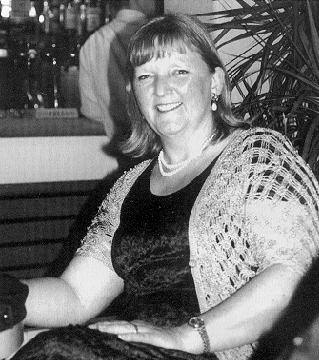
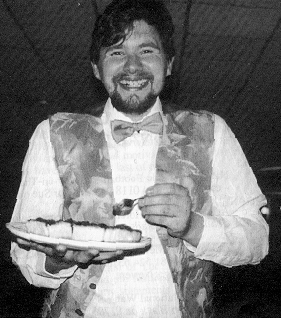
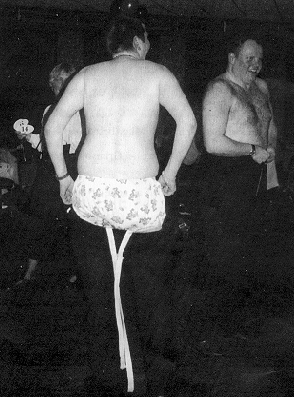
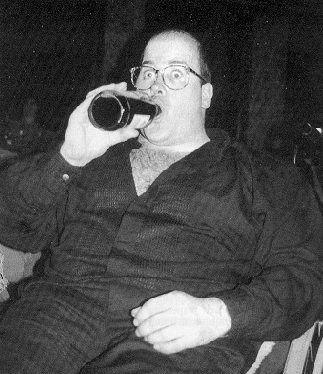 He
is very fond of Newcastle Brown.
He
is very fond of Newcastle Brown.